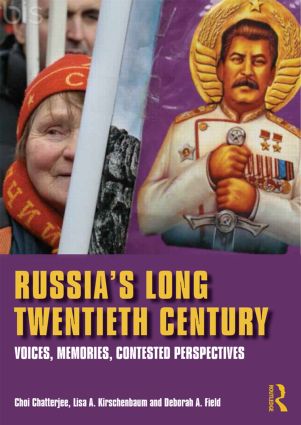Spotlight on New Textbook: Russia’s Long Twentieth Century
Choi Chatterjee, California State Univerity, Los Angeles; Lisa A. Kirschenbaum, West Chester University; Deborah A. Field, Adrain College
We wrote the book, Russia’s Long Twentieth Century: Voices, Memories, Contested Perspectives (Routledge, 2016), for our students in order to convey our fascination with Russia and with the study of history in general. We chose not to attempt another comprehensive textbook of Soviet history and instead adopted an inquiry-based approach. Each chapter begins with a story and then introduces a main question. The rest of the material in the chapter, including the primary sources featured at the end, allows students to answer or debate the question. So, for example, the chapter on World War II is structured around the question of what allowed the Soviet Union to survive and then win the war; the chapter on the Khrushchev period revolves around the question of whether the Thaw really brought about more freedom.

Our goal in designing the book in this way was to help students to understand history not as received narrative, but as a created artefact. Our emphasis on the process of writing history is also reflected in the endnotes citing sources and in our decision not to attempt to homogenize the prose, but to allow each chapter to express the voice of its primary author.
This book is short enough so that instructors can assign additional primary sources and articles, and we have emphasized themes and approaches that interest our students (and us): globalization, inequality, and identity. The prose is enlivened by quotations from memoirs and oral histories and jokes, and we have integrated mini-biographies of famous and “ordinary” people throughout the book. The book also includes useful maps and visual sources, such as paintings, posters, and photographs, which are used not just to illustrate, but also to illuminate the chapter questions.
All three of us have many years of teaching experience at schools where the students vary wildly in terms of experience, preparation, and interest; this book reflects what we have learned about teaching them. We hope that it will inspire lively class discussions and the desire for further exploration, and we recommend it for instructors introducing students to 20th century Russian history.
Image: Russia’s Long Twentieth Century: Voices, Memories, Contested Perspectives (Routledge, 2016)
